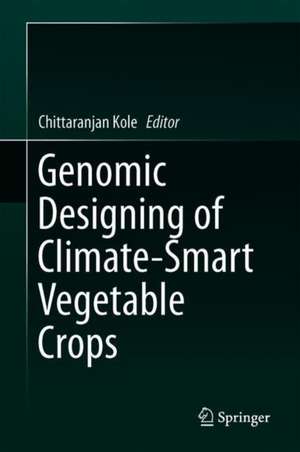Genomic Designing of Climate-Smart Vegetable Crops
Editat de Chittaranjan Koleen Limba Engleză Hardback – 3 mar 2020
This book is of interest to scientists working in the fields of plant genetics, genomics, breeding, biotechnology, and in the disciplines of agronomy and horticulture.
Preț: 1227.99 lei
Preț vechi: 1497.54 lei
-18% Nou
Puncte Express: 1842
Preț estimativ în valută:
235.01€ • 244.44$ • 194.01£
235.01€ • 244.44$ • 194.01£
Carte tipărită la comandă
Livrare economică 14-28 aprilie
Preluare comenzi: 021 569.72.76
Specificații
ISBN-13: 9783319974149
ISBN-10: 3319974149
Pagini: 383
Ilustrații: XX, 383 p. 62 illus., 44 illus. in color.
Dimensiuni: 155 x 235 mm
Greutate: 0.74 kg
Ediția:1st ed. 2020
Editura: Springer International Publishing
Colecția Springer
Locul publicării:Cham, Switzerland
ISBN-10: 3319974149
Pagini: 383
Ilustrații: XX, 383 p. 62 illus., 44 illus. in color.
Dimensiuni: 155 x 235 mm
Greutate: 0.74 kg
Ediția:1st ed. 2020
Editura: Springer International Publishing
Colecția Springer
Locul publicării:Cham, Switzerland
Cuprins
Climate-smart potato: An integrated breeding, genomics and phenomics approach.- Genomic designing for climate-smart tomato.- The importance of genetic and epigenetic research in the Brassica vegetables in the face of climate change.- Eggplant breeding and improvement for future climates.
Notă biografică
Prof. Chittaranjan Kole is an internationally reputed scientist with an illustrious professional career spanning over thirty-three years and original contributions in the fields of plant genomics, biotechnology and molecular breeding leading to the publication of more than 160 quality research articles and reviews. He has edited over 90 books for the leading publishers of the world including Springer, Wiley-Blackwell and Taylor and Francis Group. His scientific contributions and editing acumen have been appreciated by seven Nobel Laureates including Profs. Norman Borlaug, Arthur Kornberg, Werner Arber, Phillip Sharp, Günter Blobel, Lee Hartwell and Roger Kornberg. He has been honored with a number of Fellowships, Honorary Fellowships, and national and international awards including the Outstanding Crop Scientist award conferred by the International Crop Science Society. He has served at all prestigious positions in academia including as Vice-Chancellor of BC Agricultural university, Project Coordinator of Indo-Russian Center of Biotechnology in India; and Director of Research of the Institute of Nutraceutical Research at Clemson University, in USA. He worked also in the Pennsylvania State University and Clemson University as Visiting Professor in USA. Recently, he has been awarded with the Raja Ramanna Fellow by the Department of Energy, Government of India. He is also heading the International Climate-Resilient Crop Genomics Consortium and International consortium for Phytomedomics and Nutriomics as their founding Principal Coordinator.
Textul de pe ultima copertă
This book reviews modern strategies in the breeding of vegetables in the era of global warming. Agriculture is facing numerous challenges in the 21st century, as it has to address food, nutritional, energy and environmental security. Future vegetable varieties must be adaptive to the varying scenarios of climate change, produce higher yields of high- quality food and feed and have multiple uses. To achieve these goals, it is imperative to employ modern tools of molecular breeding, genetic engineering and genomics for ‘precise’ plant breeding to produce ‘designed’ vegetable varieties adaptive to climate change.
This book is of interest to scientists working in the fields of plant genetics, genomics, breeding, biotechnology, and in the disciplines of agronomy and horticulture.
Caracteristici
Demonstrates how advances in plant molecular breeding can be utilized for producing improved vegetables with climate-smart traits Highlights abiotic stress tolerance Includes contributions by international authors
